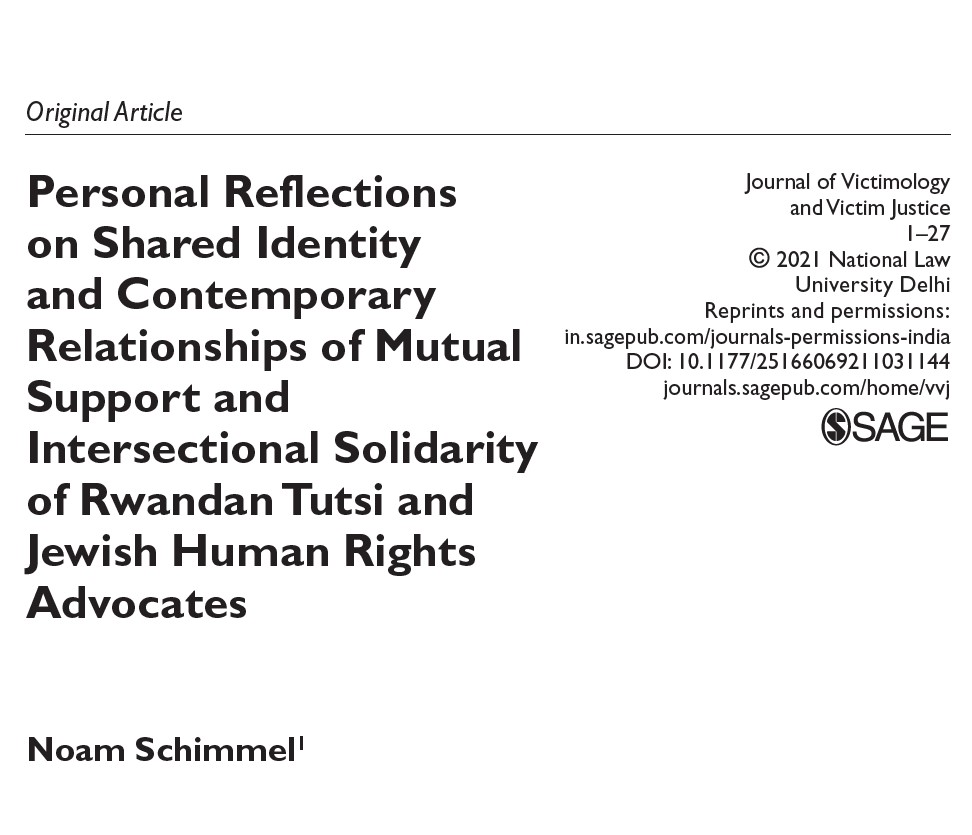
In a new paper in the Journal of Victimology and Victim Justice, Noam Schimmel writes on “Personal Reflections on Shared Identity and Contemporary Relationships of Mutual Support and Intersectional Solidarity of Rwandan Tutsi and Jewish Human Rights Advocates”:
This article is a qualitative case study of the relationships being formed between Jews and Rwandan Tutsis and the ways in which six individuals, four Tutsis and two Jews involved in advocating for the human rights and welfare of Rwandan genocide survivors articulate their understanding of the bonds between the two communities, their shared experiences, and how their history of having survived persecution and genocide brings them together. Through their testimonies, it examines similarities and differences between the Jewish and Tutsi experiences of vulnerability and persecution, ways in which Tutsis and Jews work in partnership to advance human rights and, in particular, the rights of Rwandan genocide survivors, and how their narratives of identity have evolved in interaction with one another and continue to develop. It discusses the particular projects and advocacy efforts in which both groups have engaged to advance the human rights of Rwandan genocide survivors and how through these efforts Jews and Rwandan Tutsis give expression to a shared understanding of and commitment to human rights.
The aritcle includes interviews with the Survivors Fund (SURF) UK Coordinator, David Russell, and Founder of Voices of Rwanda, Taylor Krauss, who share their experience of being Jewish and the connection which has led them to engage in work to support and advocate for survivors of the genocide against the Tutsi in Rwanda. It also conveys the experience of a number of survivors who recount their experiences anonymously. Together they tell an important story of mutual collaboration and support.
As that paper concludes…
“Although the subject of a shared historical trauma and ongoing threat and persecution are at the heart of the bond between Tutsis and Jews, what is particularly striking about all of the testimonies is the deep sense of hope and consolation that Tutsis and Jews find in one another, of communion. The intimacy of their young but deeply felt relationships is enduring. The individual bonds that have been formed are atypical; they cross tremendous geographic, cultural, religious, ethnic and class divides, and they seem to transcend them with minimal self-consciousness and relative ease. Moreover, these relationships have developed in an organic and grassroots way; they are less a function of organized relationships between Tutsi and Jewish communal leaders and institutions and more a function of individual initiatives… In future years, what has begun as the bond of solidarity of a small group of Tutsis and Jews may yet grow into a more expansive one with the potential to impact both communities on a larger scale in transformative ways that further advance the realization of human rights within their communities and beyond.”
As David Russell notes in the article, the strength of the relationship between the Jewish and Rwandan Tutsi population is very much one where both communities benefit as a result:
“I believe that ties between both communities will continue to strengthen. There are many lessons to be shared between both communities. When the interest of many others will be focused on other causes and communities, I truly believe that the Jewish connection to the Tutsis in particular will remain strong—due to this shared experience. Tutsis can help Jews to keep the flame of the Holocaust alive—as survivors of that event die; it will be Tutsi survivors which will inherit the legacy of serving as the conscience for the world. Jews can help Tutsis by helping them to rebuild their lives—and to not make the same mistakes that our community made when doing so for Holocaust survivors.”
